Keeping Mountains Pristine
The major reason for retaining the Western Cape mountains as pristine natural regions is that they are important water catchment areas in an essentially arid country. Where this function can accommodate other uses, such as recreation, then those too are permitted.
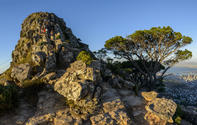
But if hikers abuse their access privilege, then it will be taken away and everyone will suffer for the bad manners of a few. It is, therefore, every hiker's responsibility to ensure that correct hiking ethics are adhered to.
If you see anyone causing unnecessary damage to the environment, and are unable to reason with them (for often it takes no more than a suggestion to correct improper behaviour), then report it to the local conservation officer. If you don't, then you too are indirectly responsible for the damage caused.
I am frequently shocked at the lack of ethical awareness among hikers, though I have come to the conclusion that it is due more to ignorance than to malevolence. No matter how many notices and forms plead with us not to litter, not to take short cuts and so on, many people believe that their own behaviour is somehow exempt from these controls.
National Hiking Way - Motto
The rule is simple - never let anyone get away with bad mountain behaviour without questioning that behaviour. It is only through example, persuasion and finally pressure that bad ecological habits change. It is a long education process; not everyone was as fortunate as myself to have learnt their mountaineering ways through the purist school.
I often wonder just what it is that drives some people to create nasty little monuments to themselves: names carved in trees and bunks, or scratched on cave walls to deface irreplaceable rock art. It probably has something to do with an inner doubt about our own worth in an industrialized society, resulting in people leaving little reminders to themselves that they really do exist.
What a pity that some bring this small-mindedness with them into the wild. Rather, we must learn to practise the National Hiking Way motto of 'take only photographs, leave only footprints'. In research conducted on hiking trails in the Western Cape, it was found that the awareness among hikers as regards accepted codes of behaviour in the natural environment was very low. Unexpectedly, this applied just as much to Mountain Club of South Africa (MCSA) members as it did to non-member hikers.
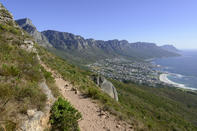
Simple Hiking Ethics
As far as ethics go, there are some simple rules you should follow:
Leave no litter, anywhere, for any reason. No exceptions.
Never take shortcuts, anywhere, for any reason. They cause erosion and unsightly scars and, anyway, are harder on your legs than the longer zigzag route.
Don't make unnecessary noise in the wild. Neither fellow hikers nor the animals appreciate it. No radios - this is what we are trying to get away from, after all.
Never use detergents in or near water bodies - they kill the small organisms that keep the water clean and drinkable.
Carry water away from a stream or pond, to soap and rinse yourself or your dishes.
Where no toilets are provided, carry a gardening trowel, and make use of it as far away from paths and campsites as you can.
Enjoy yourself, and let everyone else enjoy themselves too; don't cause anyone else to find fault with your behaviour, and let them know if they offend you (this does not apply to anyone's personal appearance of course).
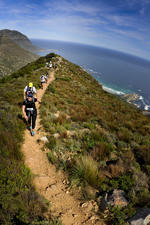
Mountain Ablutions
Consider for a moment how many people hike along a popular path in a month; then consider the amount of human and other waste that they leave behind. It is important that every hiker does his or her bit to keep pollution minimized - not only for aesthetics, but for good ecology too. Some basic pointers are: For washing yourself, utensils and clothes, always carry water away from the tap or stream and let it soak into the ground. Be kind to the environment by using biodegradable soap - if you don't, why bother mountaineering?
Do not leave any food scraps. This may seem extreme, but it invites invader Argentine ants (these displace the indigenous species, which play a role in germinating fynbos seeds). It also makes baboons aggressive and troublesome, and just looks bad. If toilets are not provided, always use your garden trowel to dig a small hole for your defecations, then cover it up with sand and rocks. Choose a spot well away from paths, with a good view and backrest for comfort if available.
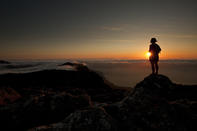
Beware of Snakes when Hiking
I really don't know why people panic so much at the sight of a snake, when I think of how terrified a snake must be when confronted by a galumphing human giant. There are only three types of snake in the Western Cape of which you should be wary: the Cape cobra, puff adder and berg adder.
In 20 years of hiking, preceded by five collecting snakes, I have never been bitten. Under normal conditions your reflexes should be faster than a snake's. I always walk with a stick, to help me up and down steep slopes and across rivers, and to prod the ground for snakes.
Most often, however, it does service as a camera tripod. Regarding snakebite, forget all about cutting and spitting, tourniquets and serum. If you know or suspect the bite is poisonous, you must stabilize the victim: keep him or her warm and calm, then go for help. Doctors today prefer to treat snakebite cases symptomatically. Pumping a victim full of serum usually increases shock and possibly allergic reaction; it should be given with great discretion. Keep your ankles covered and your wits uncovered and you will be better able to enjoy these attractive creatures of the wild.
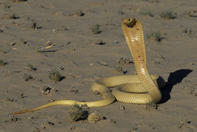
Montagu Hiking Trails
 The town of Montagu offers visitors a range of scenic short walks and tougher hiking trails throughout the Langeberg Mountain Range. If you ...more
The town of Montagu offers visitors a range of scenic short walks and tougher hiking trails throughout the Langeberg Mountain Range. If you ...more